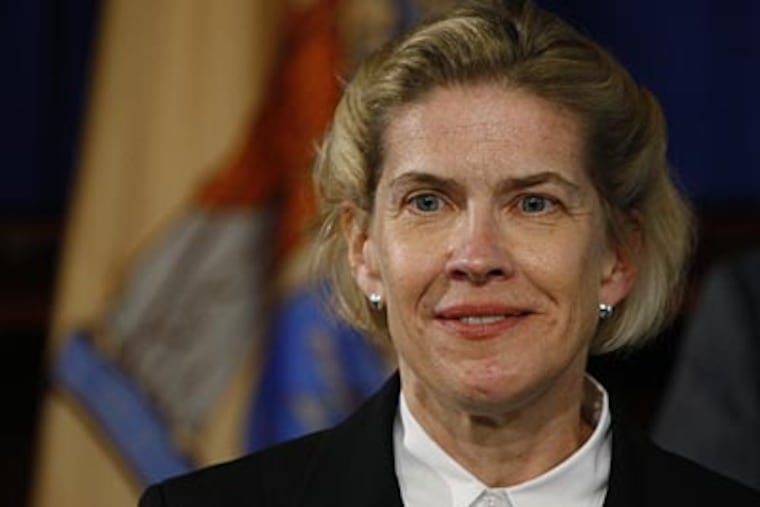Christie's court nominee clears committee
The hearing Tuesday for Gov. Christie's first state Supreme Court nominee had none of the political fireworks expected after a year's delay by Democrats angry at the governor's efforts to remake a bench he has called "out of control."

The hearing Tuesday for Gov. Christie's first state Supreme Court nominee had none of the political fireworks expected after a year's delay by Democrats angry at the governor's efforts to remake a bench he has called "out of control."
Morris County lawyer Anne M. Patterson faced little hostility from members of the Senate Judiciary Committee over 2 1/2 hours. Even one of Christie's fiercest critics, Sen. Loretta Weinberg (D., Bergen), praised Patterson's temperament, intelligence, and "ability to answer, and not answer, questions."
In the end, the committee voted, 11-1, to recommend Patterson's confirmation to the full Senate.
The approval advanced a saga that began in May 2010. The Republican governor said that month that he would deny tenure to Justice John Wallace Jr. over concerns that the top court was legislating from the bench, and that he wanted Patterson as Wallace's replacement. The Democrats, who control the Legislature, charged that Christie was infringing on the judiciary's independence and refused to schedule a hearing for Patterson.
The standoff ended last month, when Christie and Senate President Stephen Sweeney (D., Gloucester) reached a compromise and a hearing finally was set.
Patterson, a registered Republican who has donated to GOP campaigns, said Tuesday that she has not been involved in politics and was not subjected to a "political litmus test" by the Christie administration before her nomination.
"So how many times have you been to the governor's house for barbecues?" asked Essex County Democrat Nia Gill.
Never, said Patterson, who, like Christie, lives in Mendham. She said she had come to know Christie through their legal work - the governor was a corporate lawyer before becoming U.S. attorney in 2001 - and not as a friend.
Outlining her vision for the position, Patterson said that the role of justices is to apply the law without regard to politics or their personal views on governmental policies.
One week after the New Jersey Supreme Court ordered the state to spend $500 million more on education in 31 poor, mostly urban districts, Patterson sidestepped questions from Democratic lawmakers on whether she approved of the decision or agreed with the governor's contention that the court is "activist."
In more general remarks, Patterson repeatedly expressed the view that it is the role of the legislative and executive branches to set policy, though the court must point out constitutional violations, she said.
"The court must never forget that the legislative and executive branches, elected by and accountable to the State of New Jersey, are uniquely charged with the power and responsibility to set policy for our state," she said.
At another point, Patterson cautioned against justices deciding cases based on their opinion of a policy. The court generally should defer to the Legislature if a statute does not violate the state constitution, she said.
"I might, as a justice, look at a statute and think, 'I could do this in a different way.' . . . But as a justice, I think it would be incumbent on me to exercise restraint," she said.
Since his 2009 campaign, Christie has often ripped the seven-member court for overreaching in decisions that he says have driven up property taxes. He has been especially critical of the landmark Mount Laurel rulings that required that all towns provide low-income housing. The top court is expected to hear a major affordable-housing case this fall, in time for Patterson to participate if she is confirmed.
Christie also has criticized decisions in the long-running Abbott v. Burke case, which holds that poorer school districts must receive additional public funds to provide students a "thorough and efficient" education. Last week's education-aid ruling stemmed from an Abbott lawsuit that claimed that the governor's cuts in education aid in 2010 were unconstitutional.
As a partner at the Morristown, N.J., firm Riker, Danzig, Scherer, Hyland & Perretti, Patterson has represented major corporations, including those in the tobacco and pharmaceutical industries.
Earlier in the day, Ceasefire NJ, an organization that seeks to reduce gun violence, and the People's Organization for Progress, a Newark-based grassroots group, voiced opposition to Patterson's nomination. Her work defending gun manufacturers and other industries protected corporate giants against the interests of the community, they said.
In response to questioning from committee Chairman Nicholas Scutari (D., Union) on whether she could be neutral in cases with corporate defendants, Patterson said the role of an advocate speaking on behalf of a client is "entirely different than that of a judge," who must remain impartial and open-minded.
"I absolutely believe that I can be unbiased," she said.
After the hearing, Scutari said he felt good about Patterson's answers on her corporate background, but he said he still had concerns.
"We'll watch, and hopefully she'll be as evenhanded as she says she will be," he said.
Scutari said he expected Patterson to win broad support from the full Senate.
The lone vote against Patterson was cast by Sen. Raymond Lesniak (D., Union), who has said he objected to Christie's treatment of Wallace and has raised concerns that Patterson's confirmation would lead to an all-white Supreme Court bench.
In the agreement struck between Sweeney and Christie, Patterson would replace Justice Roberto A. Rivera-Soto, who is Hispanic. Rivera-Soto has said that he will not seek reappointment when his term ends in September.
The position occupied by Wallace, who is African American, will remain filled by a temporary appointee until March, when Wallace would have reached the mandatory retirement age of 70.
If confirmed, Patterson would give the court a female majority.